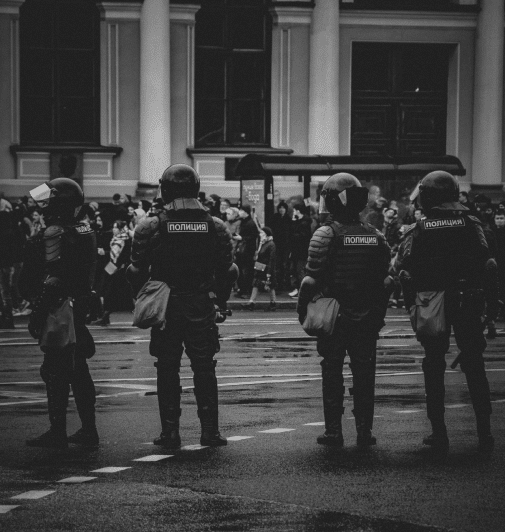Atlanta Police Brutality Lawyer
The Atlanta Police Department has a significant history of racial profiling and unconstitutional violence against citizens. If you or a loved one were victims of police misconduct, the Police Brutality Center may be able to connect you with an Atlanta police brutality lawyer who knows federal and state civil rights law and can pursue compensation for your damages.
Were you or a loved one a victim of police brutality?
Attorneys that work with Police Brutality Center may be able to assist you.
"*" indicates required fields
Content Last Updated: May 2, 2025
Atlanta’s history is rife with instances of racial profiling, police brutality, and police misconduct. While reform efforts are underway, the Atlanta Police Department still has a reputation for unlawful violence stemming from notable recent cases.
If you or a loved one was a victim of police violence, contact the Police Brutality Center. We have relationships with experienced Atlanta police brutality lawyers who can help you fight for justice and seek damages.
Police Misconduct Laws in Atlanta

Section 1983 of the Civil Rights Act of 1871 is a federal law that lets citizens file lawsuits and collect damages when the police violate their rights. Claims based on this statute are often called Section 1983 lawsuits. Your attorney must prove that an officer violated your constitutional rights to prevail.
Georgia law covers arrests and the use of deadly force under Ga. Code § 17-4-20. The law is based on the wording of federal statutes and U.S. Supreme Court cases determining when and how the police can use force.
If you file a lawsuit, you must do so within Georgia’s two-year statute of limitations for personal injury and wrongful death cases. Federal courts follow state statutes of limitations for Section 1983 lawsuits, so the same two-year filing deadline applies. If you do not file your case on time, a judge will likely throw it out.
There are additional requirements if you file a claim against a city. You must notify a municipality of your intent to sue within six months of the date of the incident that led to your injuries. If you sue the county, you have 12 months from the incident date to submit your written intention.
Atlanta Police Department History
Atlanta and other cities in the South have a long history of racial profiling and police brutality. Racism and resentment over increased numbers of Black citizens and the success of Black businesses led to the Atlanta Race Riots of 1906.
While white mobs committed the violence during the riots, there were no reports of arrests of white people. At least 250 Black residents were charged, and at least 25 Black people lost their lives. Some estimates put the number of deaths as high as 100.
The Atlanta Police Department didn’t have any Black officers until 1948. The police chief was worried white officers would violently attack the newly hired Black officers, so instead of placing them at police headquarters, he had them work out of the basement of a Black YMCA.
The Black officers were not allowed in white neighborhoods and were not given patrol cars. They did not wear their uniforms to and from work for fear of attack, especially given the killings of Black soldiers in Atlanta after they returned from WWI and WWII.
In recent years, the racial makeup of the Atlanta Police Department has come to more closely match that of the city. However, there are still problems with racial profiling and shocking instances of police misconduct.
Cases of Police Brutality in Atlanta
Several recent cases of police brutality in Atlanta highlight the continued need for change. They also show the importance of seeking justice with the help of an Atlanta police misconduct lawyer.

Johnny Hollman - 2023
An Atlanta police officer killed Johnny Hollman by shocking him with a stun gun. Hollman was in a minor car accident and was issued a citation. The police say he started a physical altercation with an officer trying to arrest him for failing to sign the ticket. The family disputes this account.
As a result of the interaction, the Atlanta police changed their policies. Officers can now write “refused to sign” on tickets instead of arresting people.

Manuel Paez Terán - 2023
Police officers shot and killed Manuel Paez Terán during a protest over the proposed police training center that protestors have derisively named “Cop City.” Officers said Paez Terán did not comply with orders to leave a tent. They fired a pepper ball inside and claimed Paez Terán fired a handgun at them.
The only witnesses were police, and none were wearing body cameras. Police shot Paez Terán more than 50 times.

Rayshard Brooks - 2022
An Atlanta police officer shot and killed Rayshard Brooks after a confrontation at a drive-thru. Brooks struggled with two officers and took a taser. He fled and turned around with the taser in his hand at one point as if to fire but then continued to run. Officer Garrett Rolfe shot him twice in the back.
The city settled with the family for $1 million. Prosecutors dropped criminal charges against both officers in 2023.

Ricardo Durado Jr. - 2022
Richard Dorado died after Atlanta police hit him in the head with batons and held him handcuffed face down for 15 minutes while officers put pressure on various parts of his body.
The City Council settled with his family for $3.75 million.
Atlanta Police Brutality Lawyers
Several attorneys and firms handle police brutality cases in Atlanta, including the following:
Late civil rights attorney Johnnie Cochran founded The Cochran Firm. It handles several types of civil rights claims.
Ben Crump handles federal civil cases involving police brutality. He is representing Tyre Nichols’ family.
Daniel J. Grossman has handled high-profile Section 1983 cases and several state-level suits against the Atlanta police department.
Jeb Butler of Butler Kahn has handled several police brutality cases, including that of Tyler Griffin.
Tonya F. Miller handles civil rights claims and represents the family of Jimmy Atchison. Atchinson was unarmed and hiding in a closet when an Atlanta police officer shot and killed him in 2019.
Why Work With a Police Brutality Lawyer?
Police brutality cases are complicated. Your attorney must overcome police claims of qualified immunity. This doctrine means police cannot be sued unless they violate a “clearly established” statutory or constitutional right. Qualified immunity often protects police officers from personal liability if they reasonably believe they acted lawfully at the time, even if they were mistaken.
In addition to overcoming this defense, an experienced Atlanta police brutality lawyer knows how federal and state claims work. They know when to file your case and what evidence you need to win compensation.
Once you hire an attorney and file a lawsuit, they can ask a court to compel the police department to release body camera footage, officer complaint histories, and other evidence critical to your case. Your attorney can also talk to potential witnesses who may be reluctant to come forward and tell their story to the police.
Filing a Civil Rights Claim in Atlanta
You can file a complaint by completing the Atlanta Police Department complaint form. There are several sections of the form that you must fill out in as much detail as possible, including:
- Incident location
- Name and contact information of witnesses
- Police officer’s badge number and name, or a physical description if you don't know those
- Photos or videos if you have them
- Evidence you have, such as medical records or copies of tickets
- Details of your complaint
If you need help deciding whether to file a lawsuit, getting legal help from a skilled Atlanta police misconduct lawyer can help. Based on the details of your case, they determine whether to file the case in state or federal court and how much you can pursue in damages. They will also ensure filing deadlines are met, engage in settlement negotiations, and fight vigorously in court if necessary.

Police Reform in Atlanta
The Atlanta Police Department’s reform ideas don’t always align with the reforms citizens want to see. For example, the police department has proposed a vast training facility that activists refer to as Cop City. The police claim it will help address problems such as excessive force. Others see it as a way for the police to become even more militarized and pose a bigger danger to citizens.
There have been several Cop City protests, including the one during which police killed Paez Terán. Police have also arrested dozens of environmental activists on domestic terrorism charges.
Georgia lawmakers have introduced three new bills to address police misconduct. The Police Accountability Act, the Ethical Policing Act, and the Preventing Tragedies Between Police and Communities Act call for significant police reform. Similar measures failed in the past, but there is hope that the police will implement some of the suggested changes regardless of the bills’ fates.
There have been calls in several cities, including Atlanta, to increase transparency by creating use-of-force databases. These databases would allow the public to track individual officers and incidents. The proposed Police Accountability Act in Georgia would require the state’s Attorney General to release a yearly police use-of-force report.
Twenty Atlanta lawyers gathered on the steps of City Hall in 2020 to protest Atlanta dragging out police brutality civil claims. Unlike some other major cities, Atlanta is not insured against officer misconduct. Money to pay lawsuits comes from taxpayer dollars, incentivizing the city to delay claims and payments.
Get Legal Help
If you or a loved one were victims of police misconduct at the hands of the Atlanta police, get legal help by contacting the Police Brutality Center. We will connect you with an experienced Atlanta police brutality lawyer to discuss your options for pursuing compensation.

